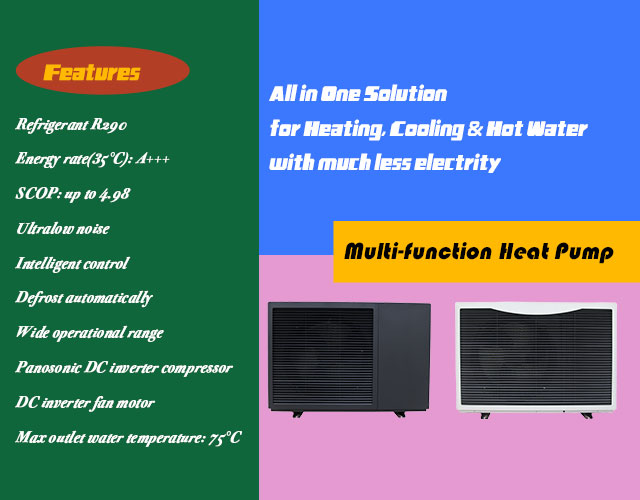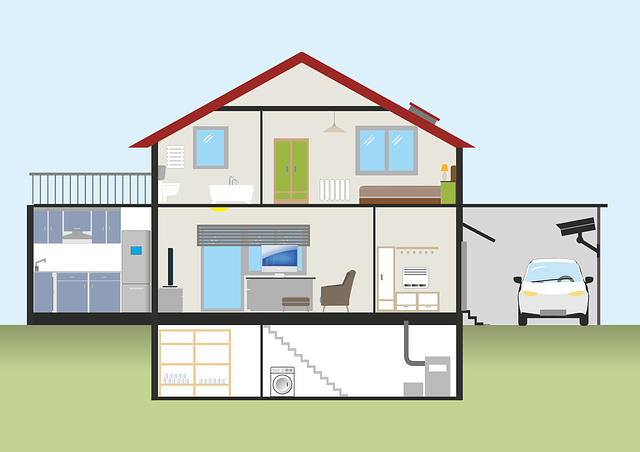A multi-function heat pump is a heating, ventilation, and air conditioning
(HVAC) system that can both heat and cool a space by moving heat from one place
to another. Unlike traditional heating systems that create heat by burning
fossil fuels, a heat pump uses electricity to transfer heat from the outside
air, ground, or water source to warm your home during colder months. In warmer
months, the process is reversed, and the heat pump can act as an air conditioner
to cool your home by removing heat from inside and transferring it outside.
In addition to heating and cooling, some multi-function heat pumps can also
provide hot water, dehumidify the air, and ventilate the space, making them a
versatile and energy-efficient solution for many homes and buildings. They are
often used in residential and commercial settings and can be a good option for
those looking to reduce their carbon footprint and save on energy bills.

Heat pumps can be classified into several types based on their operating
principles and application areas. Here are some of the common types of heat
pumps:
Air-source, water-source, and ground-source.
Air Source technology is expected to dominate the market in the U.S. over the
forecast period due to that air source is the quickest and easiest to install
and it looks like a normal air conditioning unit. You can use these units to
generate hot water or hot air, some units can also incorporate a reversing valve
to operate in cooling mode also. The main heat pump products from
Smad are air-sourced, if you need to know the installation procedures
or other requirements, you are welcome to leave your questions.
Ground source is the second most popular option, it's more commonly used for
hot water production but you can also get units and systems that can reverse to
provide cooling. It uses thermal energy embedded within the ground that comes
from the sun. This option requires extensive excavation however and is typically
costlier to install, so it's best suited to new builds as it can be incorporated
within the construction to reduce costs.
Water-source heat pumps draw heat from a pond, lake, or water deposit, Each
type has its advantages and disadvantages.

Here are some reasons why you might need a multifunction heat
pump:
Heating and Cooling: A multifunction heat pump can provide both heating and
cooling functions, which can be particularly useful in areas with varying
weather conditions. This can help you save money on energy bills by eliminating
the need for separate heating and cooling systems.
Energy Efficiency: Heat pumps are known for their energy efficiency, as they
can transfer heat from the air or ground to warm or cool your home or building.
By using a multifunction heat pump, you can further increase energy efficiency
by taking advantage of its various functions.
Space Saving: A multifunction heat pump can be a space-saving solution for
homes or buildings with limited space for HVAC systems. With multiple functions,
you can save space and still enjoy the benefits of heating, cooling, and hot
water production.
Hot Water Production: Many multifunction heat pumps can also produce hot
water, which can be useful for homes or buildings that need hot water for
showers, laundry, and other purposes. This can be a cost-effective solution
compared to using a separate water heating system.
Customizable Features: Depending on the specific model, a multifunction heat
pump can have customizable features that allow you to adjust settings and
functions based on your needs. This can provide more flexibility and control
over your HVAC system.

Choosing a multi-function heat pump can be a complex decision, but
here are some important factors to consider:
Capacity: Consider the size of your home and your heating and cooling needs.
Ensure that the heat pump you choose has the appropriate capacity to meet your
needs.
Efficiency: Look for a heat pump with high efficiency ratings, such as a high
SEER (Seasonal Energy Efficiency Ratio) and HSPF (Heating Seasonal Performance
Factor) ratings. Higher ratings mean greater efficiency and lower energy
costs.
Climate compatibility: Heat pumps work best in moderate climates. If you live
in an area with extreme temperatures, you may need a backup heating system to
supplement your heat pump.
Features: Look for features that meet your needs. For example, some heat
pumps have programmable thermostats that can help you save energy and money.
Others may offer additional features such as air purification, dehumidification,
or zoning.
Brand reputation: Choose a reputable brand with a good track record for
quality and reliability. Read reviews and check ratings from reputable sources
to get an idea of the brand's reputation.
Professional installation: A professional installation is crucial to ensure
that your heat pump works properly and efficiently. Look for an experienced and
licensed HVAC contractor to install your heat pump.
Those were some factors that you need to consider when looking for a
multi-function heat pumps. If you want more detailed information, please feel
free to let us know.


